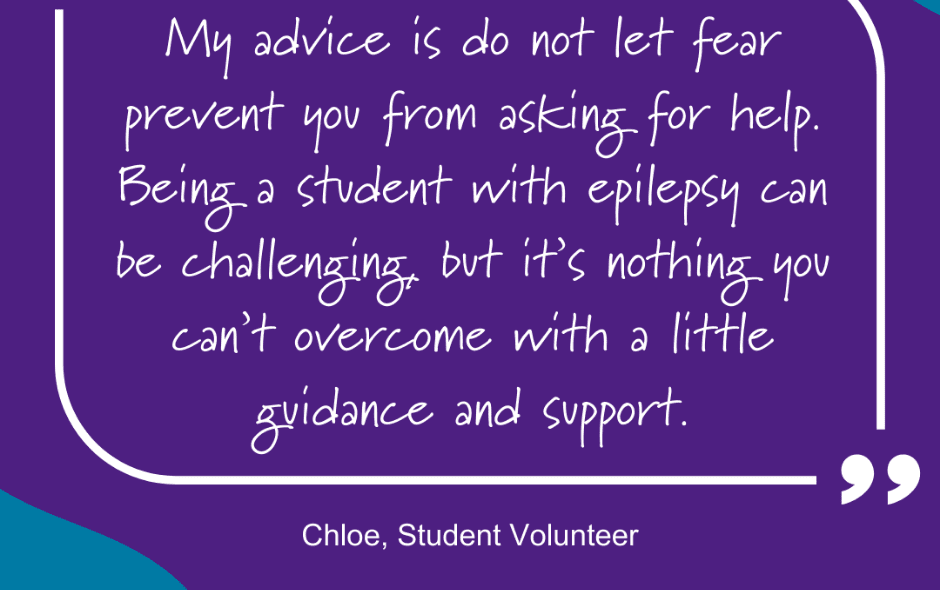Chloe is a university student who volunteers with Epilepsy Scotland, helping with our campaign to increase awareness of epilepsy amongst students.
Here, Chloe shares her experiences of having epilepsy and reflects on how this has impacted her studies.
When were you diagnosed with epilepsy?
I had my first tonic-clonic seizure at 12 years old and was in my first year of secondary school and ended up in hospital.
I continued to have tonic-clonic seizures and soon began to have absence and focal seizures as well. I was diagnosed with different variants of epilepsy one year after my first seizure.
During this time, I was having a lot of seizures and they were interfering with my school attendance and ability to learn.
I also had trouble accepting the condition. I would find ways to avoid taking my medication which meant I had very little control over my seizures.
Once I started to look after myself better, I quickly realised there were so many wonderful things I wanted to do, and I knew I was capable!
This change of mindset inspired me to spend the next five years at college getting the qualifications I needed to go to university.
Do you feel your studies are affected by your epilepsy?
Absolutely. For me, everything takes longer than it should. I begin readings for the first semester throughout the summer break because I know it takes me longer to process and understand content than the average student.
But even then, I still struggle remembering the syllabus. It can be very frustrating and fatiguing.
I miss a lot of classes because it’s like I must choose – do I use this energy to go to class or to work on an assignment for this class?
I need to constantly think about prioritising equally important activities.
It can be a struggle but staff at my university are very patient and compassionate which really takes some of the pressure off.
Do you feel your epilepsy is affected by your studies?
Yes, it’s like a double-edged sword! If I prioritise my studies, it affects my epilepsy, and if I prioritise my epilepsy, it affects my studies.
My studies affect my epilepsy in many ways, particularly through stress.
Stress is unavoidable for any student – but it can be dangerous if you have epilepsy. For some, like myself, seizures can be tightly tied to your emotions. Especially stress, which can increase seizure activity.
It can feel like another decision you must make, do I prioritise my health or my studies? The answer should always be health, but your university’s disability advisors can really help in finding a balance.
How does your university support you?
I was worried at first. There wasn’t really any information on my university’s website explaining what support I could get and I felt very anxious asking for help.
However, I received help immediately after I met with a disability advisor. They made me feel very comfortable and ensured they would do everything they could to make my student experience as easy as possible, and they really followed through.
However, there is quite a lack of understanding surrounding epilepsy and coping with epilepsy whilst studying and I wasn’t offered any information.
I think if my university had more information on being a student with epilepsy, they could really go the extra mile.
How do you support yourself to live a full and healthy life as a student?
This has been something I have found difficult. Throughout my studies, I have often fallen into a bad habit of focusing on my studies and neglecting my health and social life.
I was so focused on my studies my seizure activity increased drastically; I was even having difficulty taking my anti-seizure medication.
Also, I got frustrated with how much my epilepsy had taken over my life and contacted an epilepsy nurse based in Edinburgh who I had known for many years. This was ultimately what led to my rebuilding of a fuller and healthier life as a student.
This nurse frequently calls me to check in and together we create small goals to reach. It’s kind of like back to basics with a ‘one step at a time’ type approach, but it really works for me!
What advice do you have for other students with epilepsy, or people with epilepsy thinking about starting further or higher education?
My advice is do not let fear prevent you from asking for help. Being a student with epilepsy can be challenging, but it’s nothing you can’t overcome with a little guidance and support.
For more information and support, check out our student guide which offers advice for students with epilepsy.
If you want to know more or have any questions, get in touch with our free and confidential helpline on 0808 800 2200 or email contact@epilepsyscotland.org.uk




